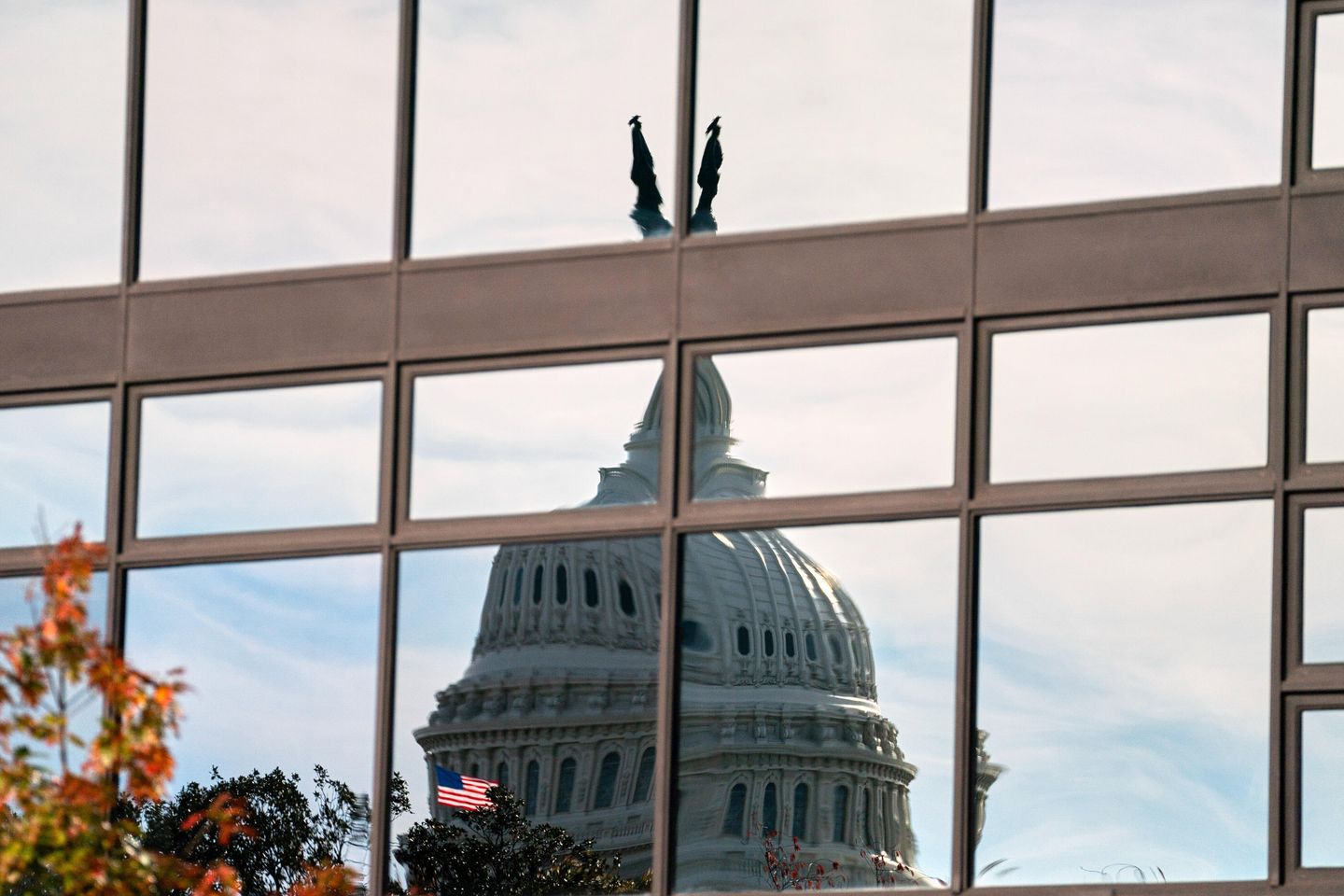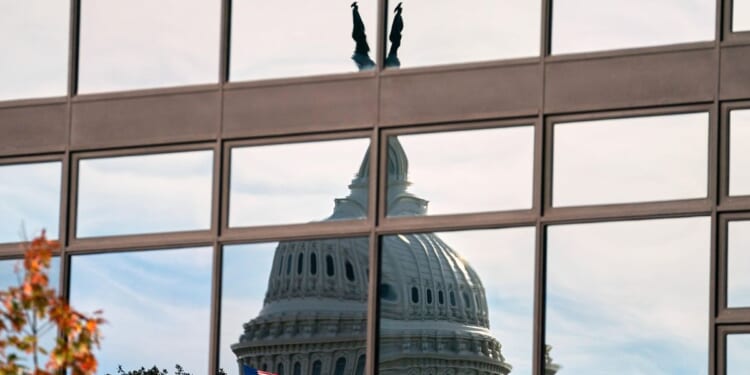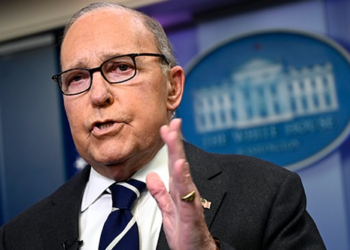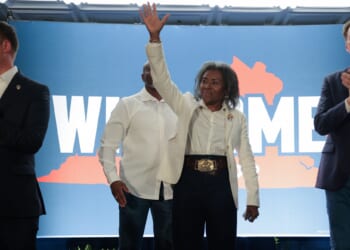
The government shutdown enters its 36th day Wednesday, marking the longest funding lapse in U.S. history, as bipartisan talks to end it gain momentum.
Republicans and Democrats continue to blame each other for the impasse, but negotiations among a bipartisan group of senators are giving some lawmakers optimism that the government could reopen as soon as this week.
The shutdown crosses the threshold for the longest ever on the anniversary of a 2024 election sweep for President Trump and congressional Republicans. Results of Tuesday’s statewide races in Virginia and New Jersey provide a check on where the electorate stands one year later.
The previous longest shutdown, the 2018-2019 partial funding lapse during Mr. Trump’s first term, was over his demand for border wall funding. The effects of that shutdown were not as widespread because Congress had enacted five of the 12 annual spending bills, including the two largest, which fund the departments of Defense, Labor, Health and Human Services, and Education.
This shutdown has affected all government agencies because Congress has not enacted any spending bills for fiscal year 2026, which began Oct. 1. A month later, the funding lapse remains unresolved.
“I don’t think any of us expected that it would drag on this long,” said House Speaker Mike Johnson, Louisiana Republican. “Right now, the Democrats fear political retribution from the far-left activists in their party more than they fear the consequences of keeping the government closed for weeks on end.”
Senate Democrats have blocked a House-passed stopgap spending bill to fund the government 14 times. They are filibustering the measure in hopes of securing a bipartisan negotiation on health care and extending enhanced Obamacare premium subsidies expiring this year.
Mr. Trump and congressional Republicans have refused to negotiate while the government is shut down, which Democrats say is the reason it has lasted so long.
“This is about to become exceptional in duration, but it was already exceptional in that we’ve never had a shutdown where one party isn’t trying to fix it,” Sen. Christopher Murphy, Connecticut Democrat, told The Washington Times.
“This shutdown would have been solved five weeks ago if the Republicans wanted to solve it,” he said. “But they believe that they don’t have to negotiate … that their party has absolute power and that they don’t have to consult with Democrats on anything.”
Bipartisan talks
Despite the frustration and finger-pointing, a bipartisan group of rank-and-file senators has been negotiating ways to end the shutdown.
Their talks have focused on advancing full-year appropriations bills in conjunction with reopening the government and guaranteeing at least a vote on the enhanced Obamacare subsidies.
Several Democrats not involved in the negotiations said they wouldn’t accept a promise of a vote. They want an outcome to ensure the enhanced Obamacare subsidies continue. Open enrollment began Saturday, and out-of-pocket premium costs are soaring for millions of Americans.
“It seems to me we are negotiating against ourselves,” said Sen. Richard Blumenthal, Connecticut Democrat. He said a promise “is not good enough for me, because I’ve come to distrust so deeply this administration and this Republican leadership.”
Even some Republicans are confused as to why Democrats would suddenly abandon their key demand after five weeks.
“That’s throwing in the towel,” said Sen. John Kennedy, Louisiana Republican. “I don’t see why they would want to, after all of this.”
Senate Democrats held an unusually long three-hour caucus lunch Tuesday to discuss their options but emerged mostly tight-lipped.
“White smoke,” Sen. Peter Welch, Vermont Democrat, said without elaborating.
Senate Minority Leader Charles E. Schumer, New York Democrat, left the door open to a potential compromise when asked where his caucus stood on the bipartisan negotiations.
“We had a very good caucus, and we’re exploring all the options,” he said.
Still, the bipartisan group appears to be making more progress on the spending piece of the equation than on the Obamacare subsidy conundrum.
One of the ideas the senators have discussed is pairing three spending bills that passed this summer and are mostly negotiated with the House, with a temporary stopgap for the remaining nine annual appropriations bills.
“The reason we’re in this position is that we have not passed appropriations bills, so beginning to break the logjam through doing that, I think, would be incredibly effective,” said Sen. Katie Britt of Alabama, one of the Republicans involved in the bipartisan talks.
Passing the three spending bills that fund the legislative branch and the departments of Agriculture and Veterans Affairs “would also take really important things off the table,” she said.
That includes full-year funding for food stamps, formally called the Supplemental Nutrition Assistance Program, or SNAP, and a nutrition program for women, infants and children, known as WIC, that provides aid to low-income families.
Shutdown impacts
SNAP has become a flash point in the shutdown. Americans flocked to local food banks after November food stamp benefits were suspended.
The Trump administration argued that it could not legally tap a SNAP contingency fund with sufficient money to provide a partial month of benefits because the underlying program was not funded. Federal courts disagreed and ordered the government to spend the contingency funds.
Mr. Trump initially said his administration would follow the court’s direction, but he announced on social media Tuesday that the SNAP funds would be distributed only after Democrats reopen the government, “and not before.” White House press secretary Karoline Leavitt insisted that the administration is “fully complying” with the court order.
Other programs that have been kept afloat through emergency funds and transfers, such as WIC and Head Start, are running out of money.
Federal workers are either furloughed or working without pay, and many are struggling to make ends meet and taking on second jobs. Air traffic controllers are calling in sick, leading to flight delays.
Outside organizations, including labor unions, airlines and other travel industry groups, have run out of patience and called on Congress to pass a clean stopgap bill to reopen the government.
“Chuck Schumer and company are going down in the history books for being total obstructionists over a nonpartisan government funding bill,” said House Majority Whip Tom Emmer, Minnesota Republican. “Meanwhile, it’s hardworking Americans who are being forced to pay the price.”
Sen. Richard J. Durbin of Illinois, the Democratic whip, said the shutdown’s impact on “everyday people” is weighing on his party but Republicans have shown no interest in a solution.
“The president was out of the country and the Republican House members were out of Washington,” he said. “I’ve never seen such absenteeism when we face such critical issues.”
Filibuster frustration
Mr. Trump has slammed Democrats as “lunatics” who block everything but said he would work with them on a health care deal to “fix” Obamacare once the government is reopened.
With his patience running short, the president has, in the past week, made repeated demands for Senate Republicans to use the “nuclear option” to circumvent Democrats and end the legislative filibuster to end the shutdown and pass other Republican priorities.
“The Democrats are far more likely to win the Midterms, and the next Presidential Election, if we don’t do the Termination of the Filibuster,” he said on social media.
Most Senate Republicans have rejected Mr. Trump’s suggestion, arguing that the filibuster is an important tool to prevent either party from holding too much power.
“It’s probably very clear that we don’t have the votes to successfully do that,” Sen. Shelley Moore Capito, West Virginia Republican, told The Times. “I signed a letter in 2017 saying I wouldn’t. And I think several of us did for a lot of different reasons, but mostly to protect minority rights or prevent things from happening.”
Several other Senate Republicans reiterated their long-held stances against scrapping the filibuster, and it did not even come up as a discussion topic during their conference lunch Tuesday.
Polls show that both parties are being blamed for the shutdown, but Republicans are generally blamed with a slightly higher share. An NBC News poll, conducted Oct. 24-28, found that 52% of voters blame Mr. Trump and congressional Republicans, compared with 42% who say Democrats are at fault.
The survey also found that 34% of respondents said they or someone in their family had employment, services or benefits affected by the shutdown, the highest share in NBC News polling covering other shutdowns in 2019, 2013, 1996 and 1995.
Senate Majority Leader John Thune, South Dakota Republican, said this shutdown is not only the longest but also “the most severe.” He said he doesn’t know why Democrats are not receiving a higher share of the blame in the polls, but the public has a right to hold all elected officials accountable.
“Shutdowns are stupid,” he said. “Nobody wins.”










